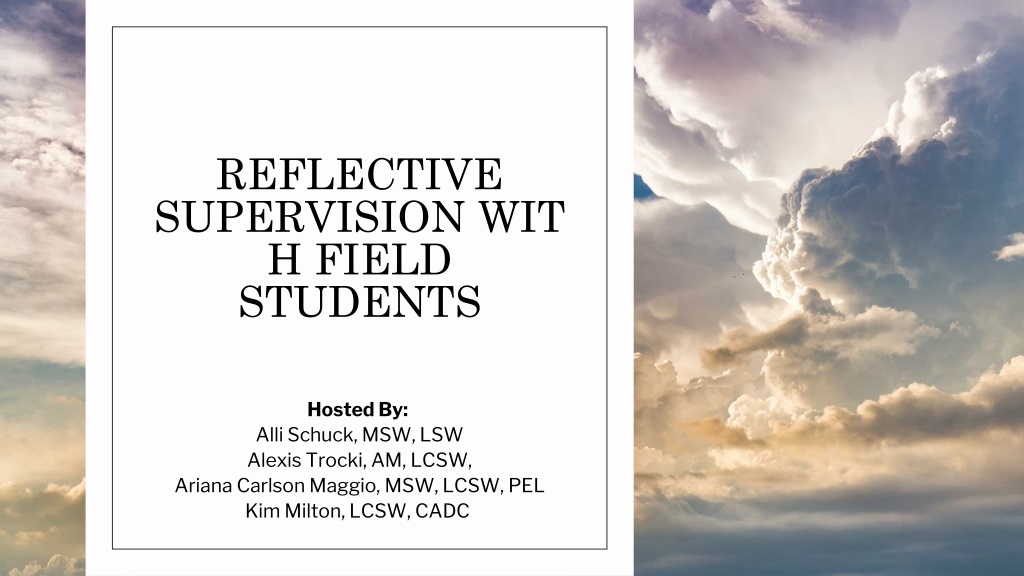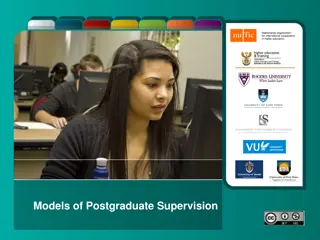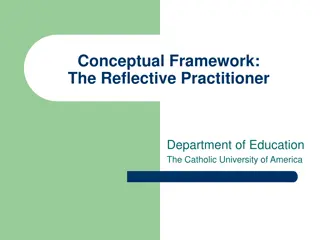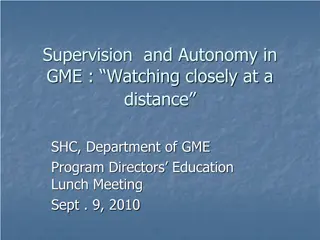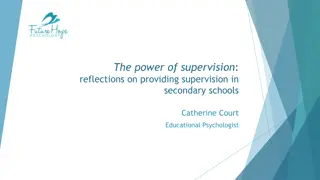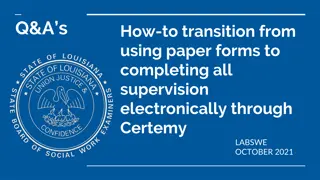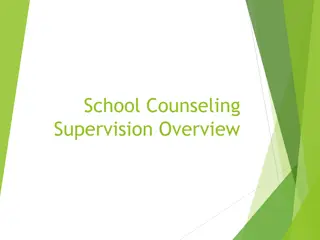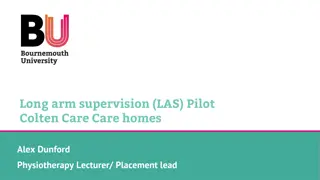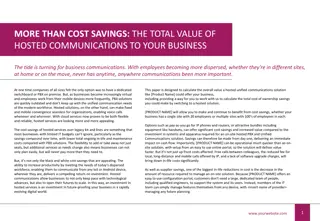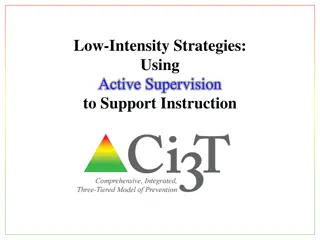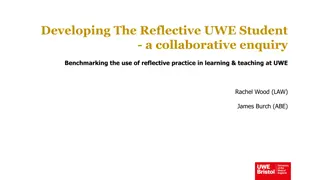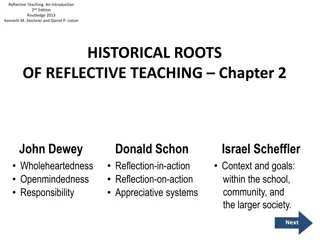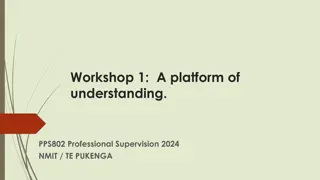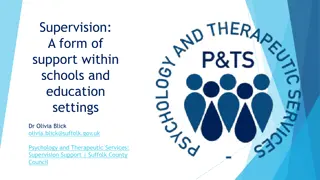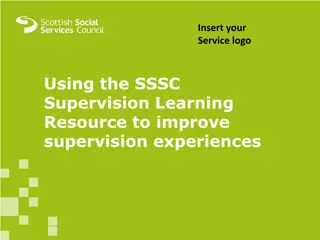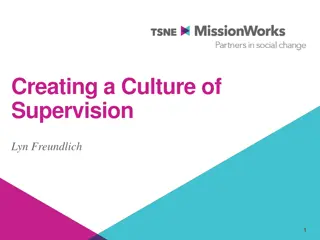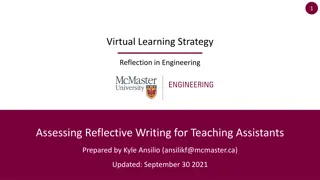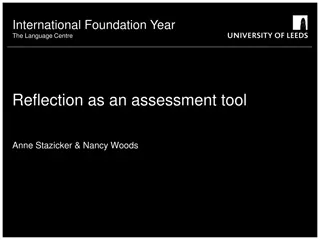Reflective Supervision for Field Students: Hosted by Experienced Practitioners
Gain insights into reflective supervision in the field of social work with experienced professionals such as Alli Schuck, Alexis Trocki, Ariana Carlson Maggio, and Kim Milton. Join breakout rooms with cameras and microphones on, ensuring participant privacy and maximizing airtime mindfulness.
Download Presentation

Please find below an Image/Link to download the presentation.
The content on the website is provided AS IS for your information and personal use only. It may not be sold, licensed, or shared on other websites without obtaining consent from the author. Download presentation by click this link. If you encounter any issues during the download, it is possible that the publisher has removed the file from their server.
E N D
Presentation Transcript
REFLECTIVE SUPERVISION WIT H FIELD STUDENTS Hosted By: Alli Schuck, MSW, LSW Alexis Trocki, AM, LCSW, Ariana Carlson Maggio, MSW, LCSW, PEL Kim Milton, LCSW, CADC
Break-out Rooms: Camera on, Microphone on Maintain participant privacy. GROUP Be mindful of your airtime. AGREEMENTS Other Agreements?
Presentation Objectives 01 02 03 DEFINE REFLECTIVE SUPERVISION. UNDERSTAND ITS IMPORTANCE IN THE ROLE OF FIELD EDUCATION AND DEVELOPING EMERGING SOCIAL WORKERS. IDENTIFY 1-2 WAYS YOU CAN INCORPORATE REFLECTIVE SUPERVISION INTO YOUR SOCIAL WORK PRACTICE.
BREAKOUT GROUP INTRODUCTIONS
Case Study Questions How would you approach each situation? What was your initial reaction when reading these scenarios?
DEFINE REFLECTIVE SUPERVISION Objective #1
WORD CLOUD ACTIVITY
Consistent Private Characteristics of Reflective Supervision Mutual Collaborative Reflective Relational
Traditional vs. Reflective Supervision Traditional Supervision Reflective supervision Directive Non-directive Role = teacher/manager Role = relational No/little self-disclosure Self-disclosure used to explore responses to the work Focus on case content Focus on how the practitioner is responding to the work Performance focused Relationship focused Building student capacity to navigate complexity Shea, 2019
COMPLETE THE SELF- REFLECTION TOOL ON YOUR OWN
https://www.icmhp.org/wp-content/uploads/2020/03/Reflective-Practice-Guide.pdfhttps://www.icmhp.org/wp-content/uploads/2020/03/Reflective-Practice-Guide.pdf
"ONE MUST BE WILLING TO ENGAGE WITH AND WONDER ABOUT THEIR OWN THOUGHTS AND FEELINGS IN ORDER TO UNDERSTAND THE THOUGHTS AND FEELINGS OF ANOTHER" Shea, 2019
UNDERSTAND ITS IMPORTANCE IN THE ROLE OF FIELD EDUCATION AND DEVELOPING EMERGING SOCIAL WORKERS Objective #2
SURVIVE TO THRIVE
MASLOW'S HIERARCHY IN FIELD
Reflection Connection Completing Hours, Tasks, Technology
Less autonomous to more autonomous Fostering Student Learning Self-efficacy Experiential learning theory Flexibility: Openness new ideas Student resilience Wright,2018 Bogo, 2017
Reflective practice Council on Social Work Education (CSWE) Competencies Reflection & Professional Competency Relational & Reflective Capacity
Contemplation Curiosity Self-awareness Reflective Competencies Professional/personal development Emotional Response Parallel Process Weatherstron, 2009 as cited in Shea, 2019
Parallel Process Clien t- Inter n Reflection of practice relationship Model relational space Hold space for curiosity, reflection & exploration Thus allowing intern to do so in practice Consider who holds this space for you?
Reflective practice & supervision Increased/ongoing awareness Anti-racist & anti-oppressive social work practice Implicit Bias Identifying assumptions Modeling exploration & reflective stance Method for application of cultural humility
"A PARTNERSHIP FORMED FOR LEARNING AND FOR DEVELOPING A DEEPER AWARENESS ABOUT ALL ASPECTS OF A CLINICAL CASE, ESPECIALLY THE SOCIAL, EMOTIONAL, AND OVERALL INTERRELATED COMPLEXITY OF DEVELOPMENTAL DOMAINS." SHAHMOON-SHANOK 2006, P. 344
Characteristics of Reflective Supervisors Attentive Engaged Thoughtful Self-aware Curious Tomlin et al. 2014, as cited in Shea, 2018
What does a reflective supervisory relationship look like? Collaborative Follows the supervisee's lead Non-directive Explores supervisee's emotional response to the work Recognizing a power differential No "right answer" Focused on critical thinking Empowering students to explore their "compass" to working with difficult and nuanced situations Shea, 2019
DEVELOPING A COMPASS Shon, 1983, Bogo 2015; Hendricks et al. 2013 as cited in Shea, 2019
Longevity of placement Efficacy Potential Field Outcomes Increased capacity for independent problem solving Contribution to life- long learning
IDENTIFY 1-2 WAYS YOU CAN INCORPORATE REFLECTIVE SUPERVISION INTO YOUR SOCIAL WORK PRACTICE Objective #3
REFLECTIVE LEARNING IS AN HOLISTIC, CREATIVE AND ARTISTIC PHENOMENON WHICH ENDEAVORS TO HOLD THEORY AND PRACTICE TOGETHER IN A CREATIVE TENSION. IT ALSO ALLOWS FOR UNCERTAINTY AND MISTAKES AND ACKNOWLEDGES THE COMPLEXITY, DIVERSITY AND EMOTIONALITY OF SITUATION OFFERS MORE SCOPE FOR STUDENT PRACTITIONERS TO REACH INFORMED DECISIONS WHICH, BY EMBRACING THE BREADTH OF KNOWLEDGES WHICH INFLUENCE DECISIONS, COULD HELP AVOID DEFENSIVE, ROUTINISED AND RITUALISTIC RESPONSES. Ruch, as cited in Davys & Beddoe 2009
"GILKERSON (2004) SUGGESTS THAT WHEN ENGAGED IN REFLECTIVE PRACTICE, ONE MUST ASK, WHAT DID YOU DO AND MOST IMPORTANTLY, HOW DID YOU FEEL ABOUT WHAT YOU DID? Shea, 2019
Strategies to Utilize Reflective Supervision Ensure consistent supervision opportunities Take a collaborative stance; fight the need to "be the expert" Prioritize open-ended questions with your students Ask the student to share ideas: What are your thoughts about that? How do you think you can approach this? Ask students about their emotional response to the work: How did that feel when you experienced this? How do you think the client felt during that encounter? Explore accountability aspects: What is getting in the way of your work?
What barriers may exist for you to provide reflective supervision? What do you do in your current practice that enhances reflective competencies of your students? How do you feel about what you are doing in your supervision? How comfortable do you feel with "non-directive" supervision?
Potential Barriers to Utilizing Reflective Supervision Student readiness for reflective capacity Student needing more directive supervision Supervisor readiness and education Agency contexts
CASE STUDY #1 REVISIT
CASE STUDY #2 REVISIT
BREAKOUT GROUP CASE STUDY
Case Study Questions Reflect back on your initial reaction to these scenarios. How can you use the knowledge of your emotional reaction to determine how to best support this student and the field placement? In reflecting on today's discussion, what would you do differently in your approach with the student? What elements of your apporach foster a reflective stance? What would you need to support a reflective stance ?
REVISIT THE WORD CLOUD ACTIVITY
Resources and References Bogo, Z. (2017). Best practices in social work field education: from global to local. Council on Social Work Education. (2015a). Educational policy and accreditation standards. Retrieved from https://www.cswe.org/getattachment/Accreditation/Accreditation- Process/2015-EPAS/2015EPAS_Web_FINAL.pdf.aspx Davys, A., & Beddoe, L. (2009). The Reflective Learning Model: Supervision of Social Work Students. Social Work Education, 28(8), 919 933. https://doi.org/10.1080/02615470902748662 Franklin, L. (2011). Reflective Supervision for the Green Social Worker: Practical Applications for Supervisors. The Clinical Supervisor, 30(2), 204 214. https://doi.org/10.1080/07325223.2011.607743 Shea, S. (2019). Reflective Supervision for Social Work Field Instructors: Lessons Learned from Infant Mental Health. Clinical Social Work Journal, 47(1), 61 71. https://doi.org/10.1007/s10615-018-0677-2 Tomlin, A., Weatherston, D., & Pavkov, T. (2014). CRITICAL COMPONENTS OF REFLECTIVE SUPERVISION: RESPONSES FROM EXPERT SUPERVISORS IN THE FIELD: Critical Components of Reflective Supervision. Infant Mental Health Journal, 35(1), 70 80. https://doi.org/10.1002/imhj.21420 Wayne, J., Bogo, M., & Raskin, M. (2010). Field education as the signature pedagogy of social work education: Congruence and disparity. Journal of Social Work Education, 46(3), 327-339. Wring, D. (2018, October). From Good to Great: An Innovative Bridge Program Developing Professionalism and Self-Reflection in Social Work Students Entering the Field : The Field Educator. Field Educator Journal. https://fieldeducator.simmons.edu/article/from-good-to-great-an-innovative-bridge-program-developing-professionalism-and-self- reflection-in-social-work-students-entering-the-field/ https://www.mhc.wa.gov.au/media/2641/mental-health-network-sub-network-pe-anded-report-clinical-reflect.pdf https://www.icmhp.org/wp-content/uploads/2020/03/Reflective-Practice-Guide.pdf https://link.springer.com/article/10.1007/s10615-018-0677-2
